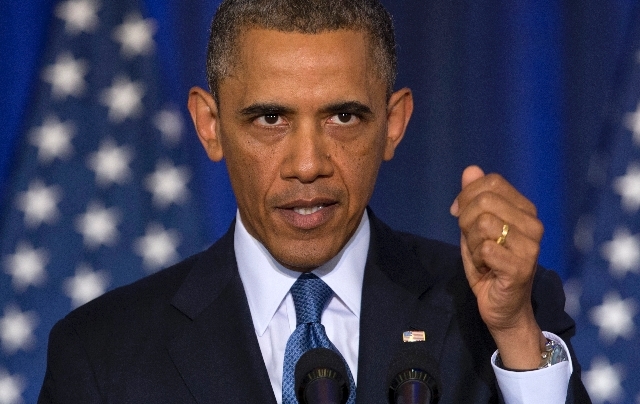Obama refocuses terror threat to pre-9/11 level

WASHINGTON (AP) — Some call it wishful thinking, but President Barack Obama has all but declared an end to the global war on terror.
Obama is not claiming final victory over extremists who still seek to kill Americans and other Westerners. Instead, he is refocusing the long struggle against terrorism that lies ahead, steering the United States away from what he calls an equally frightening threat – a country in a state of perpetual war. In doing so, Obama recasts the image of the terrorists themselves, from enemy warriors to cowardly thugs and resets the relationship between the U.S. and Islam.
His speech Thursday was designed to move America’s mindset away from a war footing and refine and recalibrate his own counterterrorism strategy. Obama asserted that al-Qaida is “on the path to defeat,” reducing the scale of terrorism to pre-Sept. 11 levels. That means that with the Afghanistan war winding down, Obama is unlikely to commit troops in large numbers to any conflict – in Syria or other countries struggling with instability in the uncertain aftermath of the Arab Spring – unless, as his critics fear, he tragically has underestimated al-Qaida’s staying power.
“Wishing the defeat of terrorists does not make it so,” said Rep. Mac Thornberry, a Texas Republican who is vice chairman of the House Armed Services Committee and a member of the House Intelligence Committee.
In Thornberry’s view, Obama is pushing the idea that “we can simply declare al-Qaida beaten and go back to the pre-9/11 era.”
From the beginning of his presidency, Obama’s centerpiece of his national security strategy has been a desire to move beyond the wars he inherited in Iraq and Afghanistan, as well as in the shadowy spaces occupied by al-Qaida and its offshoots now creeping up in North Africa and elsewhere.
Those endeavors consumed enormous amounts of his administration’s time and attention during his first term, not to mention the incalculable costs paid by military members and their families.
“This war, like all wars, must end,” he said. “That’s what history advises. That’s what our democracy demands.”
As Obama edges toward a new approach to national security, his political opponents are quick to raise doubts.
“Too often, this president has sought to end combat operations through rhetoric rather than reality,” GOP Rep. Howard P. “Buck” McKeon of California, chairman of the House Armed Services Committee, said Friday.
“He has declared the war in Iraq over, but the insurgency there continues. He has declared an end to combat operations in Afghanistan, but the Taliban fight on. He has now declared the war on terrorism over, despite a terrorist attack in Britain this week, a terrorist attack in Boston last month and a terrorist attack in Libya that left a U.S. ambassador and three other Americans dead last year.”
Yet the president cautioned against a return to what he called a complacency in counterterrorism before Islamic extremists hijacked U.S. jetliners and slammed them into the World Trade Center and the Pentagon.
“Make no mistake,” he said, “our nation is still threatened by terrorists,” noting that the deadly attacks in Benghazi, Libya, last September and in Boston last month were tragic reminders.
But he also left little doubt that he thinks it is time to turn the page on the post-9/11 approach. He was referring not only to the controversial use of armed drones to target terrorists in Pakistan, Afghanistan and other countries, but also the commitment of tens of thousands of U.S. ground troops in conventional fighting.
“For all the focus on the use of force, force alone cannot make us safe,” he said. “We cannot use force everywhere that a radical ideology takes root,” adding that “a perpetual war – through drones or Special Forces or troop deployments – will prove self-defeating and alter our country in troubling way.”
Some counterterrorism experts long have argued that the global war on terror should be brought to a close, and that some of the policies and programs put in place after 9/11 should be reconsidered and possibly changed.
James Lewis, a national security expert at the Center for Strategic and International Studies, argues for a more traditional approach to battling terrorism, largely through law enforcement and the intelligence community.
Lewis said that ending the fight against terrorism will help reinforce the administration’s message that America is not at war with Islam.
“It helps, because it delegitimizes the terrorists,” said Lewis. “They want to think of themselves as warriors. We want the world to think of them as crooks. We want everyone in every country not to think of them as terrorists defending Islam, but as people who are psychos. They are criminals, and that’s what we want to paint them as.”
That is closely in line with Obama’s description of what remains of the terrorist threat.
He said core al-Qaida, the organization formerly led by Osama bin Laden, is “a shell of its former self.” The president said that while one of its most troublesome affiliates, al-Qaida in the Arabian Peninsula, is a force to be reckoned with, “in the years to come, not every collection of thugs that labels themselves al-Qaida will pose a credible threat to the United States.”
He also cautioned against the threat of homegrown extremists and said terrorism may never go away entirely.
“But as we shape our response, we have to recognize that the scale of this threat closely resembles the types of attacks we faced before 9/11,” he said.
—
Associated Press writer Lolita C. Baldor contributed to this report.